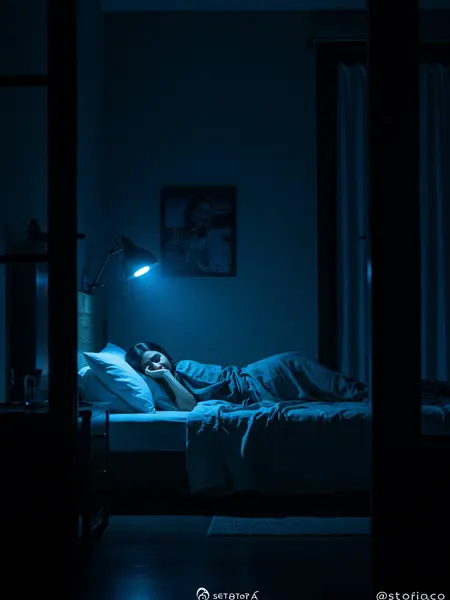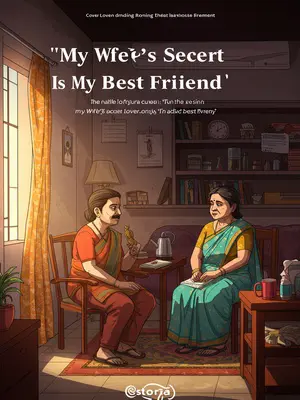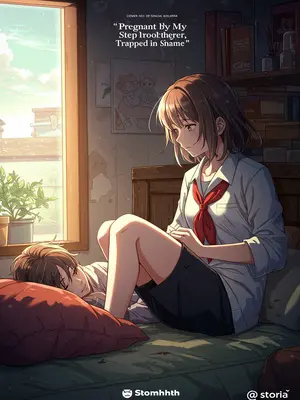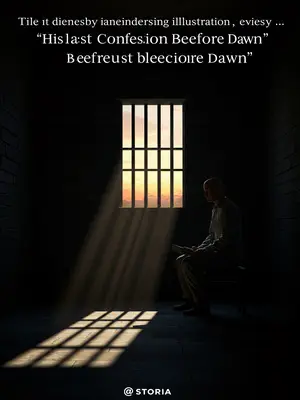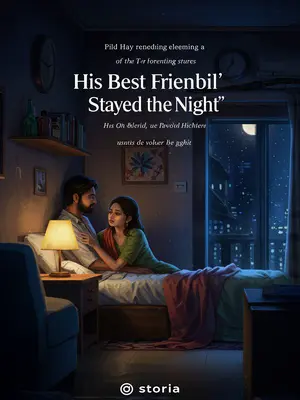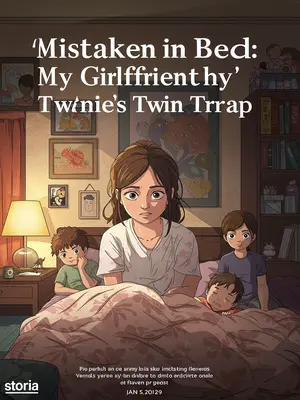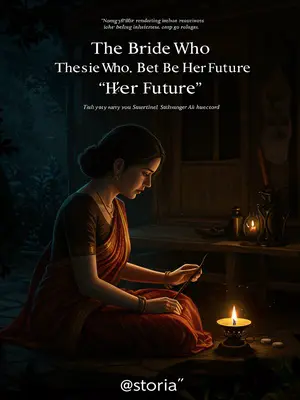Chapter 2: Memories, Confessions, and Doubt
A bitter smile crept onto my lips—helpless, sardonic, the kind you get when the universe decides to play a cruel joke. It was like those endless serials Amma watches, except here there was no dramatic music to warn me, no commercial break to catch my breath.
Whether anyone else knew, I certainly did: there had been no intimacy. I remembered every awkward moment, every missed glance, every night we turned our backs just to avoid temptation. The longing was thick, but we respected the boundaries drawn by science and fate. Every morning, as she handed me my tiffin, her fingers brushed mine—just for a second, but it was enough to remind me of all we were missing.
Ever since IVF started, Meera had been extra careful, always reminding me: “Arre, don’t forget what the doctor said, okay?” Her voice became a gentle mantra, drifting through the kitchen as she set alarms for her injections.
"Doctor said if you accidentally get pregnant naturally while on medication, hormone levels will go haywire—very difficult to protect the pregnancy."
I’d tap her nose, teasing, “You really listen to the doctor, yaar!”
She’d catch my double meaning, half-pouting, leaning into my arms: “Of course, but I listen to you the most, Doctor.” Our little world in Andheri—peeling paint, noisy neighbours—felt safe, protected by our private jokes.
After starting ovarian stimulation, she became even more cautious—walking in tiny steps, cradling her belly. Even with the injection bruises peeking out from under her churidar sleeve, she still made sure to light the evening diya. My mother would silently approve, whispering prayers at the mandir for our luck.
I’d try to lighten things. “Don’t start walking like a heroine from an old black-and-white film, yaar.” Sometimes she’d smile, sometimes just shake her head at my foolishness.
And now, someone was telling me she’d spent a passionate night with another man? The thought was a slap—unthinkable, impossible, as if the sky had turned green. My thoughts tangled again, like a Mumbai traffic jam, but I forced myself to breathe.
The egg retrieval failed; the procedure ended early. Meera was wheeled out, still unconscious. Even without makeup, a bit pale, her beauty shone through. Her hair was messily tied, gold studs glinting in the harsh OT light. She looked like the same woman who once stood by our window, watching the Mumbai rain, lost in her thoughts.
I stared at her, lost in my own.
We’d first met at a matrimonial meet-up. I was late—Andheri traffic, a patient in the ICU. I ran across the road, nearly crashing into a pani puriwala, shirt stuck to my back with sweat, mother’s missed calls piling up. I half-expected her to have left, like the others before.
But Meera was still there, sitting quietly, not a word of complaint. She smiled and poured me a glass of lemon water. The lemon water tasted of too much salt, but I drank it anyway, grateful just to be there. Her calm was like those rare Mumbai mornings, before the trains start honking. I felt seen, not judged.
She was my type—art teacher, beautiful, romantic, with paint-stained hands and an easy grace. I could picture her coaxing children to draw peacocks, laughter echoing under slow ceiling fans. When she laughed, a dimple creased her left cheek, and I thought, “This is it, bhai. Don’t let this one go.”
After three months, we married. At first, we thought, bas, let’s see what happens with children. But a year passed, and she wasn’t pregnant. Relatives started hinting, then asking outright: “So, any good news yet?” Meera would squeeze her mangalsutra, forcing a polite smile as aunties cornered her at family functions. We felt like actors in someone else’s drama.
Being a doctor, I knew there might be a problem with one of us. It’s strange—knowing too much, yet still helpless. Every month was a question mark, a diagnosis in waiting.
Getting checked is no small thing. It means awkward truths, family whispers, and elders who believe such matters are best left to God. Meera was reluctant. “We’ve only been married a year, can’t we wait?” Her voice was small, scared. I disagreed gently: “Medically, if a couple hasn’t conceived after a year, it’s considered infertility.”
I tried to reassure her. “If there’s a problem, we’ll treat it. If not, we’ll relax—being emotionally stable helps.” I joked, “The test is easier than my internship postings, yaar.” She smiled, but I could see her worry.
When it was time, she confessed—during her first love in college, she’d had an ectopic pregnancy and lost a fallopian tube. She twisted her dupatta nervously, lips trembling, voice breaking. I sat beside her, torn between anger and tenderness, until I just pulled her close. I reached out, wiping her tears with the edge of my sleeve, the way my father used to for my mother when no one was watching.
Manly pride, forgiveness, and relief all mixed together. We’re all adults—who doesn’t have a past? If my parents knew half my stories, Amma would faint. Why hold Meera to a different standard?
She swore she’d never contacted her ex again, even showing me her WhatsApp: “I didn’t delete him because I don’t care. If you mind, I’ll delete him—no problem.” There was defiance and vulnerability both. I waved it off—after all, I still had my first love’s WhatsApp. Policing her would make me small.
We tried another year; still no luck. Meera herself suggested IVF. I hesitated: “How about an HSG to check the tube?” I worried about her pain, about jumping too soon to IVF. My doctor’s mind and husband’s heart argued daily. I’d grown up hearing, “Let nature do its work.” IVF felt like cheating fate, but our desire to be parents was stronger than any dogma.
Meera was determined: “Anyway, we want a child, and the longer we wait, the harder it gets. Might as well do IVF now.” She said it with that stubborn chin and shining eyes. I brushed a stray hair from her forehead. “Aren’t you afraid of the pain?”
She snuggled in: “Of course I’m afraid. But if it means having your child, it’s worth it. I love you too much, yaar. I can’t live without you, so I can only use having a baby to keep you…” Her words tumbled out, raw and unrehearsed. She wrapped her arms around my neck and kissed my cheek. My heart melted, and I handed her my debit card on the spot.
In our country, a man pays—it’s pride, tradition, and the only comfort I could offer. Maybe it was her attitude; she never let IVF make her invisible. She dressed up, painted her nails, played old Hindi songs, and smiled through the pain. Our neighbours whispered, “What’s her secret?” They didn’t see the injection bruises, or the silent tears.
Thinking of her surgery this morning, I remembered last night—how I’d tried to swap night shifts, but she insisted, “Don’t make a fuss, or I’ll get insomnia and today’s egg retrieval will suffer.” That’s Meera—practical, never wanting anyone to suffer on her behalf.
Yet now, at this critical moment, someone suggested she’d chosen a passionate night with another man? The thought was absurd, like a bad TV drama. Anger surged, and for a moment I wanted to storm off, leave her to wake up alone. But her words, her trust, held me back.
As a wife, she had done something so wrong to me. Divorce isn’t easy—here, it means gossip, whispers, stares at the grocery shop. I couldn’t let her off, but I couldn’t ignore our years together either.
I picked up her phone, unlocking it with her fingerprint. My thumb hovered over her WhatsApp, the phone screen smudged with her foundation, as if even the device carried traces of her. Nothing unusual—not even contacts with cleared chat records. I opened her first love’s chat. Last month, he’d sent “happy birthday.” She didn’t reply. His status showed family photos—she didn’t comment or like. In India, WhatsApp statuses say everything. But here, just silence.
Trusting my instincts, the person who spent the night with her shouldn’t be her first love. My gut told me what my heart didn’t want to believe—it had to be someone else.
My head ached just thinking about it. Who, exactly, was that person? Just then, her phone vibrated in my hand. A new message. From an unknown number.
